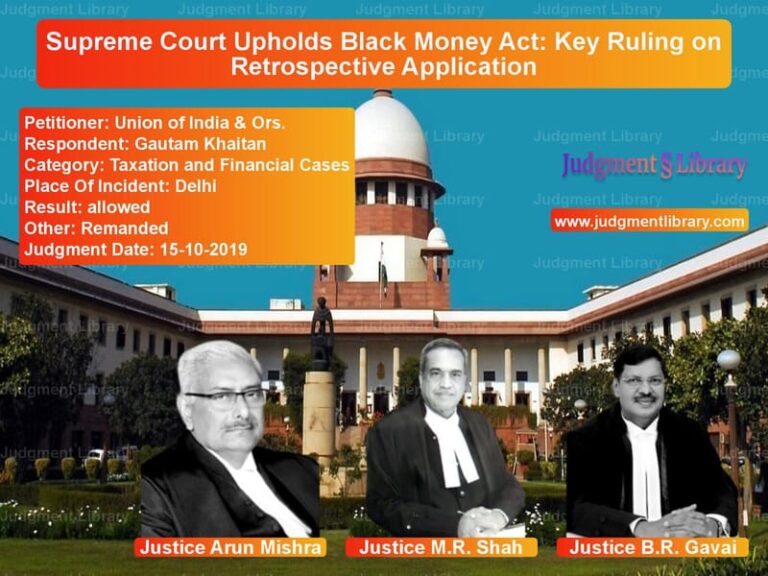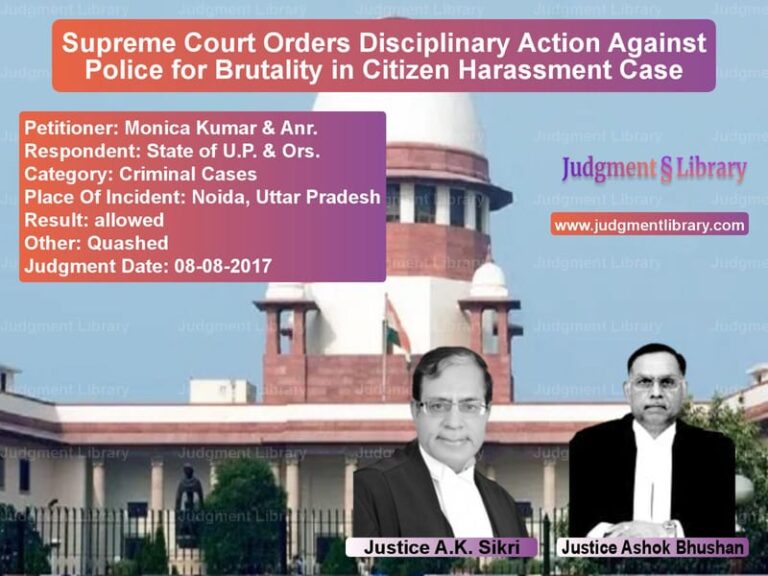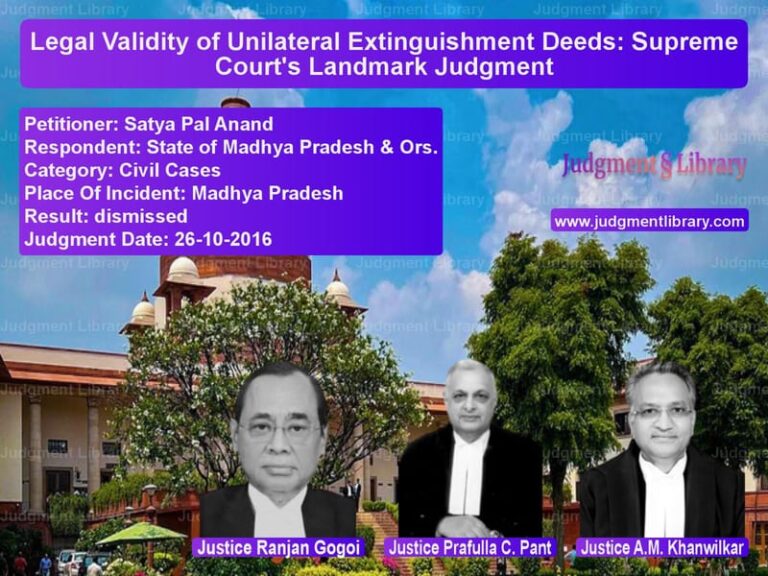Supreme Court Acquits Appellant in Murder Case: Importance of Reliable Evidence in Criminal Trials
The Supreme Court of India, in Md. Sajjad @ Raju @ Salim vs. State of West Bengal, examined the validity of witness identification and circumstantial evidence in a murder case. The Court set aside the conviction and acquitted the appellant, emphasizing the need for clear and reliable evidence in criminal trials.
Background of the Case
The case arose from an incident on July 12, 1993, when a dead body was found on the road in Kolkata with a handkerchief tied around its neck. The deceased was later identified as Ramchandra Singh. Post-mortem examination confirmed death due to strangulation.
The prosecution alleged that the appellant, along with co-accused, was involved in the murder. The case was based on circumstantial evidence, particularly the testimony of witnesses who claimed to have seen the deceased in the company of the accused before the murder. The appellant was convicted by the Trial Court under Section 302 read with Section 34 of the Indian Penal Code (IPC), and the conviction was upheld by the Calcutta High Court.
Key Issues Before the Supreme Court
- Whether the identification of the appellant by witnesses was reliable.
- Whether the circumstantial evidence sufficiently established the appellant’s guilt.
- Whether the delay in conducting the Test Identification Parade (TIP) affected the credibility of the prosecution’s case.
Petitioner’s Arguments (Md. Sajjad @ Raju @ Salim)
- The appellant argued that the case against him was purely circumstantial, with no direct evidence linking him to the crime.
- The Test Identification Parade (TIP) was conducted more than two months after the incident, rendering the identification unreliable.
- The prosecution witnesses had not provided any specific identifying features of the accused before the TIP.
- The suspicion raised by the victim’s wife regarding the appellant’s involvement was insufficient to sustain a conviction.
Respondent’s Arguments (State of West Bengal)
- The prosecution relied on the testimony of three key witnesses who claimed to have seen the deceased with the appellant before the murder.
- The identification of the appellant during the TIP corroborated the witnesses’ statements.
- The appellant had past disputes with the deceased, providing a motive for the crime.
- The prosecution argued that the chain of circumstantial evidence was strong enough to establish the appellant’s guilt beyond a reasonable doubt.
Supreme Court’s Observations
The Supreme Court critically analyzed the evidence presented and made the following key observations:
- The TIP was conducted two and a half months after the incident, which created a significant possibility of memory distortion in the witnesses.
- None of the witnesses had provided any distinguishing features of the accused before the identification process.
- The alleged meeting between the accused and the deceased took place at night and lasted for only a few minutes, making reliable identification unlikely.
- The prosecution failed to establish a direct link between the appellant and the murder.
Final Judgment
The Supreme Court set aside the conviction and acquitted the appellant, stating:
“In the absence of reliable identification and corroborative evidence, the prosecution has failed to establish the appellant’s guilt beyond a reasonable doubt. The benefit of doubt must go to the accused.”
The Court also extended the benefit of acquittal to the non-appealing co-accused, as there was no stronger evidence against him.
Implications of the Judgment
The judgment has significant implications for criminal jurisprudence:
- It reinforces the principle that identification evidence must be reliable and conducted without undue delay.
- The ruling highlights the importance of corroborative evidence in circumstantial cases.
- It prevents wrongful convictions based on weak or speculative identification.
- The decision ensures that suspicion alone cannot substitute for concrete proof in criminal cases.
Conclusion
The Supreme Court’s decision in Md. Sajjad @ Raju @ Salim vs. State of West Bengal upholds the fundamental principle that an accused person cannot be convicted based on unreliable identification and uncorroborated circumstantial evidence. The ruling reinforces the importance of procedural fairness and the necessity of establishing guilt beyond a reasonable doubt in criminal cases.
Don’t miss out on the full details! Download the complete judgment in PDF format below and gain valuable insights instantly!
Download Judgment: Md. Sajjad @ Raju @ vs State of West Bengal Supreme Court of India Judgment Dated 06-01-2017.pdf
Direct Downlaod Judgment: Direct downlaod this Judgment
See all petitions in Murder Cases
See all petitions in Judgment by Pinaki Chandra Ghose
See all petitions in Judgment by Uday Umesh Lalit
See all petitions in allowed
See all petitions in acquitted
See all petitions in supreme court of India judgments January 2017
See all petitions in 2017 judgments
See all posts in Criminal Cases Category
See all allowed petitions in Criminal Cases Category
See all Dismissed petitions in Criminal Cases Category
See all partially allowed petitions in Criminal Cases Category







